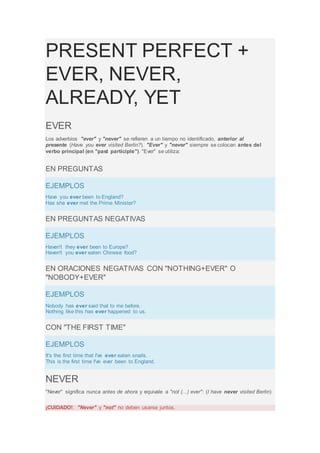Present perfect n
•Download as DOCX, PDF•
0 likes•1,217 views
The document discusses the use of the present perfect tense with adverbs like "ever", "never", "already", and "yet" in English. It provides examples of how each adverb is used with the present perfect: "ever" is used in questions and negative questions and sentences with "nothing/nobody ever"; "never" means not ever and is not used with "not"; "already" refers to actions that occurred before now but not a specific time; and "yet" is used in negative questions and statements to refer to the period between the past and present.
Report
Share
Report
Share

Recommended
Recommended
More Related Content
What's hot
What's hot (20)
1.12 futuro simple en inglés uso de auxiliar will y forma going to

1.12 futuro simple en inglés uso de auxiliar will y forma going to
Similar to Present perfect n
Similar to Present perfect n (20)
Past perfect & past perfect contiuous level 8 week 1

Past perfect & past perfect contiuous level 8 week 1
PresentandPastPerfect.JoselynSantana.English1.pptx

PresentandPastPerfect.JoselynSantana.English1.pptx
More from Ymmij Hurtado Valerio
More from Ymmij Hurtado Valerio (9)
Recently uploaded
Recently uploaded (12)
Multi-cluster Kubernetes Networking- Patterns, Projects and Guidelines

Multi-cluster Kubernetes Networking- Patterns, Projects and Guidelines
The Use of AI in Indonesia Election 2024: A Case Study

The Use of AI in Indonesia Election 2024: A Case Study
ER(Entity Relationship) Diagram for online shopping - TAE

ER(Entity Relationship) Diagram for online shopping - TAE
History+of+E-commerce+Development+in+China-www.cfye-commerce.shop

History+of+E-commerce+Development+in+China-www.cfye-commerce.shop
The Best AI Powered Software - Intellivid AI Studio

The Best AI Powered Software - Intellivid AI Studio
Present perfect n
- 1. PRESENT PERFECT + EVER, NEVER, ALREADY, YET EVER Los adverbios "ever" y "never" se refieren a un tiempo no identificado, anterior al presente (Have you ever visited Berlin?). "Ever" y "never" siempre se colocan antes del verbo principal (en "past participle"). "Ever" se utiliza: EN PREGUNTAS EJEMPLOS Have you ever been to England? Has she ever met the Prime Minister? EN PREGUNTAS NEGATIVAS EJEMPLOS Haven't they ever been to Europe? Haven't you ever eaten Chinese food? EN ORACIONES NEGATIVAS CON "NOTHING+EVER" O "NOBODY+EVER" EJEMPLOS Nobody has ever said that to me before. Nothing like this has ever happened to us. CON "THE FIRST TIME" EJEMPLOS It's the first time that I've ever eaten snails. This is the first time I've ever been to England. NEVER "Never" significa nunca antes de ahora y equivale a "not (...) ever": (I have never visited Berlin) ¡CUIDADO!: "Never" y "not" no deben usarse juntos.
- 2. I haven't never been to Italy. I have never been to Italy. ALREADY "Already" se refiere a una acción que ha ocurrido en un tiempo anterior al presente pero no especificado. Sugiere que no es necesario repetir la acción. EJEMPLOS I've already drunk three coffees this morning. (= ¡y me estás ofreciendo otro!) Don't write to John, I've already done it. También se utiliza para preguntar: Have you already written to John? Has she finished her homework already? "Already" puede colocarse antes del verbo principal (en "past participle") o al final de la frase: I have already been to Tokyo. I have been to Tokyo already. YET "Yet" se utiliza en oraciones negativas e interrogativas, con el significado de (no) en el periodo temporal entre el pasado y el ahora, (no) hasta el momento presente, incluido éste. Suele colocarse al final de la frase. EJEMPLOS Have you met Judy yet? I haven't visited the Tate Gallery yet Has he arrived yet? They haven't eaten yet